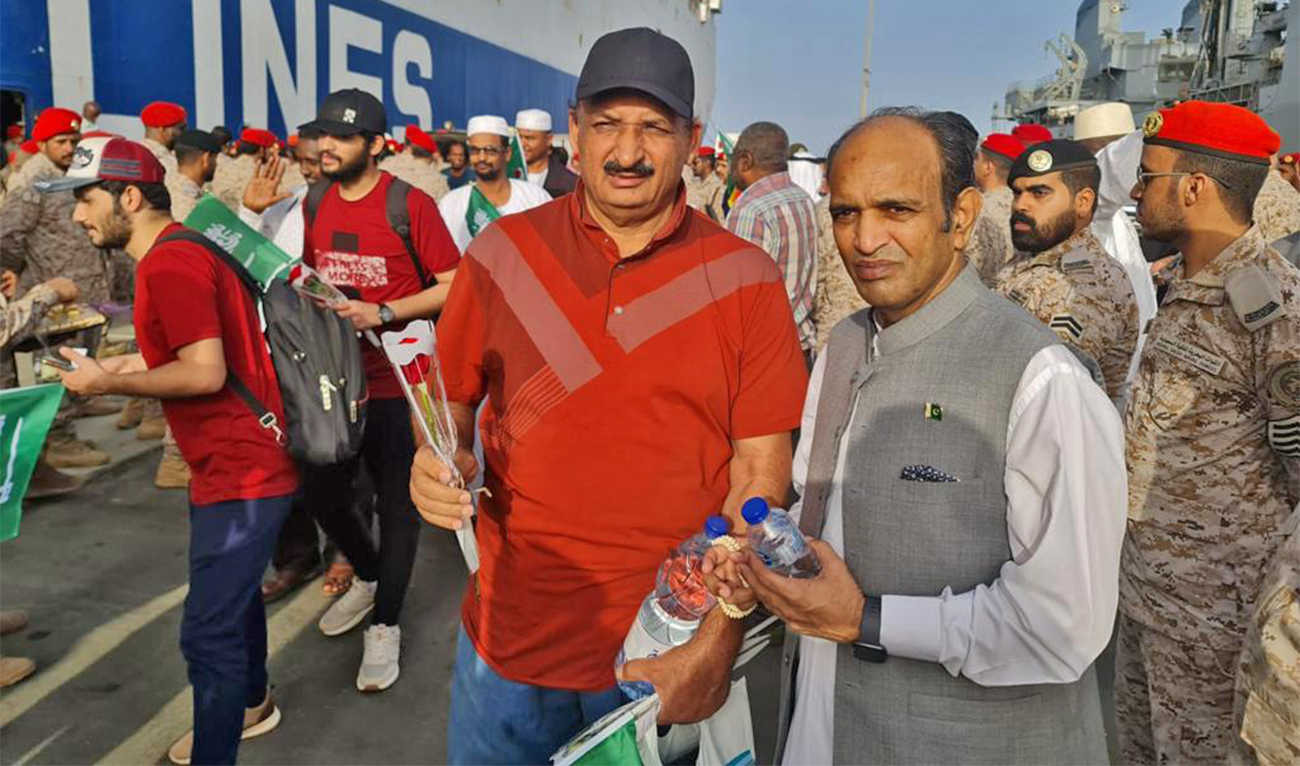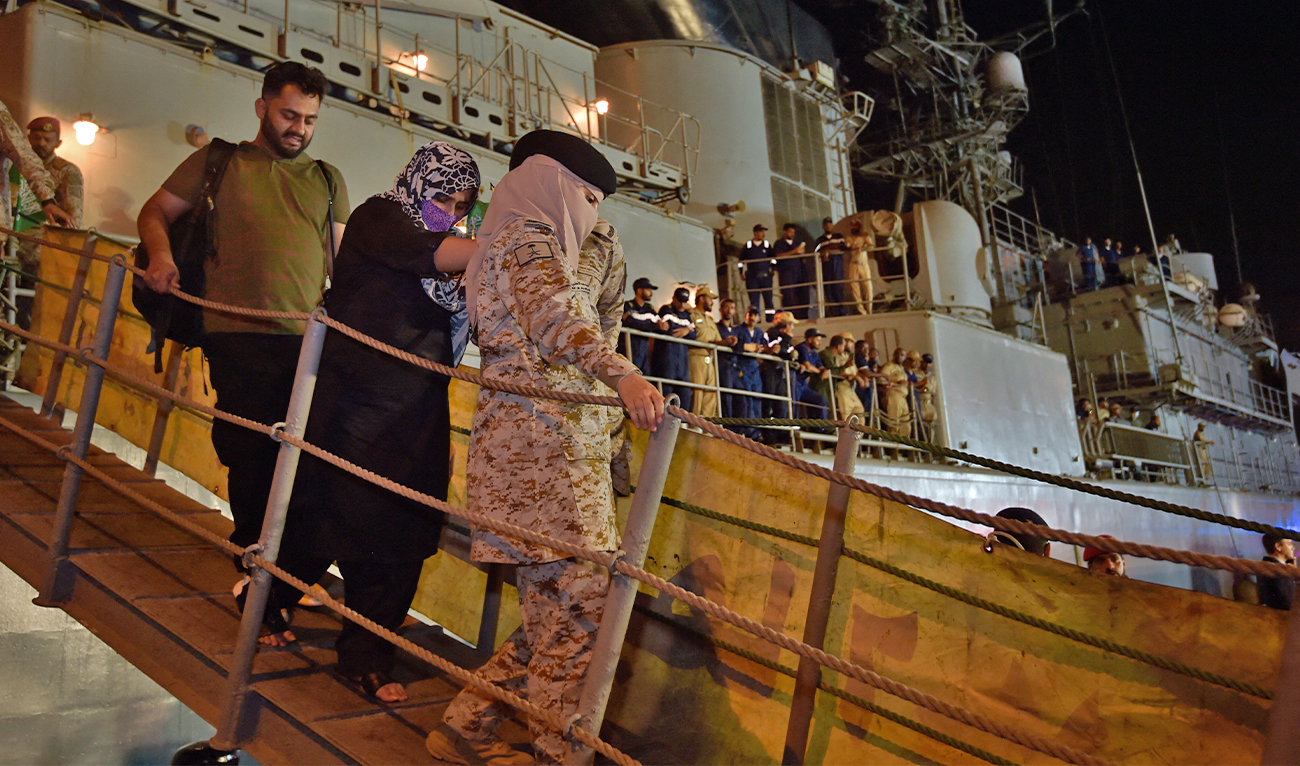ISLAMABAD: Pakistani nationals who arrived at the Saudi port city of Jeddah after being evacuated from Sudan said on Thursday that their experience was nothing short of a nightmare after fierce fighting broke out between the army and paramilitary forces in the northeastern state of Africa in recent weeks.
Many of these people expressed gratitude to Saudi Arabia for bringing them to the safety of its shores while acknowledging that the kingdom played an instrumental role in evacuating foreign nationals who were still stranded in Sudan.
“After Allah Almighty, we are thankful to the Saudi government and the Pakistan embassy for being alive,” Khawaja Abdul Rauf, who reached Jeddah on a Saudi ship along with 37 other Pakistani nationals on Wednesday, told Arab News.

Consul General of Pakistan in Jeddah, Khalid Majid (right), receives a Pakistani national evacuated from Sudan upon arrival at King Faisal navy base in Jeddah, Saudi Arabia, on April 26, 2023. (Photo courtesy: Pakistani consulate in Jeddah)
The Pakistan embassy in Sudan transported over 900 nationals from the capital city, Khartoum, to Port Sudan on the eastern edge of the country amid the ongoing conflict. There are over 1,300 Pakistani citizens in Sudan, and their movement became possible during a 72-hour cease-fire brokered by the United States after nearly 10 days of urban warfare and hundreds of deaths.
“I am really thankful to the Saudi government for what they have done for us in this difficult time as it was a very difficult task,” Rauf continued. “But with the grace of Allah, they have made it possible and facilitated our safe travel to Jeddah.”

A Saudi Navy sailor assists people evacuated from Sudan upon their arrival at King Faisal navy base in Jeddah, Saudi Arabia, on April 26, 2023. (AFP)
Discussing the situation in Sudan, Khurshid Alam, a Pakistani national and chemical engineer, said the conflict between the two warring camps was affecting the civilian population.
“The paramilitary force used guerrilla tactics and entered people’s houses in civilian areas which almost paralyzed the whole system. No one feels safe in Sudan,” he said, adding that there was no longer any electricity, water, gas, or Internet in the African state.
Arif Noor, another evacuee, said continuous airstrikes and gunfire made it difficult for people to find a safe route to the Pakistan embassy in Khartoum.
“Smoke filled the air, and stray bullets penetrated our homes, making it difficult for us to escape,” he continued. “It was very hard to find a safe route to reach the Pakistan embassy. But we arrived at the facility with the help of local friends.”

Consul General of Pakistan in Jeddah, Khalid Majid, receives a Pakistani nationals evacuated from Sudan upon their arrival at King Faisal navy base in Jeddah, Saudi Arabia, on April 26, 2023. (Photo courtesy: Khurshid Alam)
He said the embassy transported around 400 Pakistanis on seven buses to Port Sudan.
“It took almost 20 hours to reach there,” he continued. “During the journey, everyone feared for his safety.”
Noor informed the embassy advised the people to keep water and dry ration with them while traveling to Port Sudan.
Muhammad Riaz, another Pakistani, expressed his gratitude to Saudi Arabia for carrying out the evacuation process and providing foreign nationals accommodation in hotels.
“It was chaos everywhere,” he told Arab News. “Even at Port Sudan, hundreds of people are waiting to leave, and Saudi Arabia is the only country doing civilian evacuation, free of charge, and without discrimination.”
After spending 24 hours traveling by sea, the ship arrived safely in Jeddah yesterday, he said, and upon arrival, the Saudis warmly welcomed the evacuees by offering sweets, flowers, and Saudi flags.
“They even provided us with accommodations in hotels,” Riaz added. “We do not have words to express our gratitude for their generosity.”
Another evacuee, Sajjad Akram, applauded the Saudi government and Pakistani embassy’s support not only for their community but also for people belonging to other nationalities.
“It is indeed a very kind gesture from the Saudi government,” he said. “The arrangements made by the Pakistani mission in Khartoum for our movement to the port were also very impressive.”
He said the Pakistani mission was not only supporting its own citizens but also helping people of other nationalities.


















